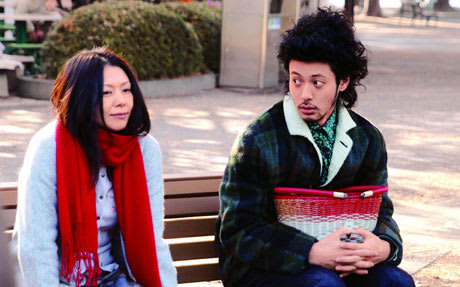Takemura (Jô Odagiri) is a wild-haired slacker drifting aimlessly through life without plans, ambitions and seemingly, without even family or friends. He also owes 800,000 yen (that's about ten grand Canadian), an unfortunate fact that brings a burly debt collector named Fukuhara (Tomokazu Miura) to his door. The debt collector wrestles him to the ground, stuffs a sock into his mouth and gives him a three-day deadline.
Things look pretty bleak for Takemura until the debt collector returns two days later with an unusual proposition. All the young man has to do is take a walk with him and he'll pay him enough money to erase the debt. The catch is he's got to walk through Tokyo wherever and for as long as Fukuhara demands. Takemura is understandably leery but really, even a too-good-to-be-true proposition is better than the unpleasant alternative.
The rest of the film unfolds as a quirky and beautiful love letter to Tokyo, as the two men embark upon their long and fateful walk. Slowly, Fukuhara's motivations for the journey are revealed as the two men visit places in the city that hold memories and meanings for him. The unusual adventure slowly transforms the adversaries into friends as they literally drift through the busy city streets.
There is a lot more than just quirky humour in Adrift in Tokyo. Satoshi Miki reveals the beauty in everyday life in ways that are touching even when the activities themselves seem cliché — a ride on a rollercoaster takes on a languid and acutely existential tone, and a pause to listen to a busker on the street turns into a trippy psychedelic jam.
A flawless balance between humour and heartbreaking emotion, Adrift in Tokyo establishes Satoshi Miki as a strong, unique voice on the Japanese film landscape. His hands-off approach to directing allows the actors the space they need to bloom in front of our eyes.
Yes, there are funny gags and goofy digressions in the plot but the two actors have enough room to breathe and ultimately, to deliver the emotional payload that the film's setup promises.
(Evokative)Things look pretty bleak for Takemura until the debt collector returns two days later with an unusual proposition. All the young man has to do is take a walk with him and he'll pay him enough money to erase the debt. The catch is he's got to walk through Tokyo wherever and for as long as Fukuhara demands. Takemura is understandably leery but really, even a too-good-to-be-true proposition is better than the unpleasant alternative.
The rest of the film unfolds as a quirky and beautiful love letter to Tokyo, as the two men embark upon their long and fateful walk. Slowly, Fukuhara's motivations for the journey are revealed as the two men visit places in the city that hold memories and meanings for him. The unusual adventure slowly transforms the adversaries into friends as they literally drift through the busy city streets.
There is a lot more than just quirky humour in Adrift in Tokyo. Satoshi Miki reveals the beauty in everyday life in ways that are touching even when the activities themselves seem cliché — a ride on a rollercoaster takes on a languid and acutely existential tone, and a pause to listen to a busker on the street turns into a trippy psychedelic jam.
A flawless balance between humour and heartbreaking emotion, Adrift in Tokyo establishes Satoshi Miki as a strong, unique voice on the Japanese film landscape. His hands-off approach to directing allows the actors the space they need to bloom in front of our eyes.
Yes, there are funny gags and goofy digressions in the plot but the two actors have enough room to breathe and ultimately, to deliver the emotional payload that the film's setup promises.
